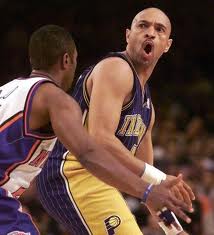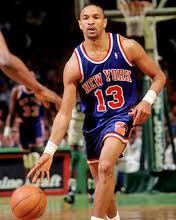 NEW YORK — With five seconds remaining in the game and his Indiana Pacers clinging to a 97-95 lead, Mark Jackson saw his former running mate, Patrick Ewing—a man Jackson once dished dimes to as if it were his personal duty—miss a finger-roll that would have forced overtime.
NEW YORK — With five seconds remaining in the game and his Indiana Pacers clinging to a 97-95 lead, Mark Jackson saw his former running mate, Patrick Ewing—a man Jackson once dished dimes to as if it were his personal duty—miss a finger-roll that would have forced overtime.
And like that, the New York Knicks saw their 1994-1995 NBA season end.
Way back then, Jackson was a paradox.
A son of New York City, but a demon to its fans.
 Drafted by the Knicks with the 18th overall pick in 1987, Jackson spent the first five years of his career wearing blue and orange. He called Ewing a teammate and Madison Square Garden his home.
Drafted by the Knicks with the 18th overall pick in 1987, Jackson spent the first five years of his career wearing blue and orange. He called Ewing a teammate and Madison Square Garden his home.
Yet on May 21, 1995, there he was, embracing Reggie Miller—the basketball city’s arch-nemesis—for all of the 19,763 fans that filled MSG to see. Jackson had been instrumental in helping Miller beat Ewing’s Knicks after the Pacers lost to New York in the playoffs the previous two years.
But before then, Jackson, as a member of the Knicks, thrived in New York under Rick Pitino. He was a man who was living his dream.
Jackson was born in Brooklyn Jewish Hospital in April 1965 and spent the first seven years of his life living in the East New York section of Brooklyn. His family moved to Saint Albans, Queens, and it was there that Jackson began dreaming of one day playing for his hometown Knicks.
“I had to reach all the way to 34th Street and Earl Monroe,” Jackson recalled.
Jackson attended Brooklyn’s Bishop Loughlin High School before beginning a standout NCAA career at St. John’s University in Queens. Jackson would eventually realize his dream when he was drafted by his hometown Knicks in 1987. The following year, in 1988, he won the NBA’s Rookie of the Year Award.
And in 1989, Jackson, still a member of the New York Knicks, was named to the NBA’s Eastern Conference All-Star team for the only all-star selection of his career.
He would go on to play in the NBA for a total of 17 years. His 10,334 career assists ranks him third all-time behind John Stockton (15,806) and Jason Kidd (11,888), and he’s arguably the greatest pro point guard to come out of New York City.
But the dream was taken away from him when the Knicks traded Jackson to the Los Angeles Clippers in September 1992 for a package of players built around Doc Rivers and Charles Smith.
Without Jackson, the Knicks went 60-22 in the ensuing season. And with Ewing and Pat Riley, the Knicks became an Eastern Conference powerhouse. In the three seasons they had together without Jackson, together, Riley and Ewing had a win-loss record of 172-54.
The Knicks, however, couldn’t get over the hump, though they came within a single game of winning the 1994 NBA Finals.
Jackson, watching from Los Angeles, was fueled. And that’s why, as a member of the Indiana Pacers some years later, Jackson loved to stick it to the hometown team that traded him away.
Very nice piece. Congrats Moke.